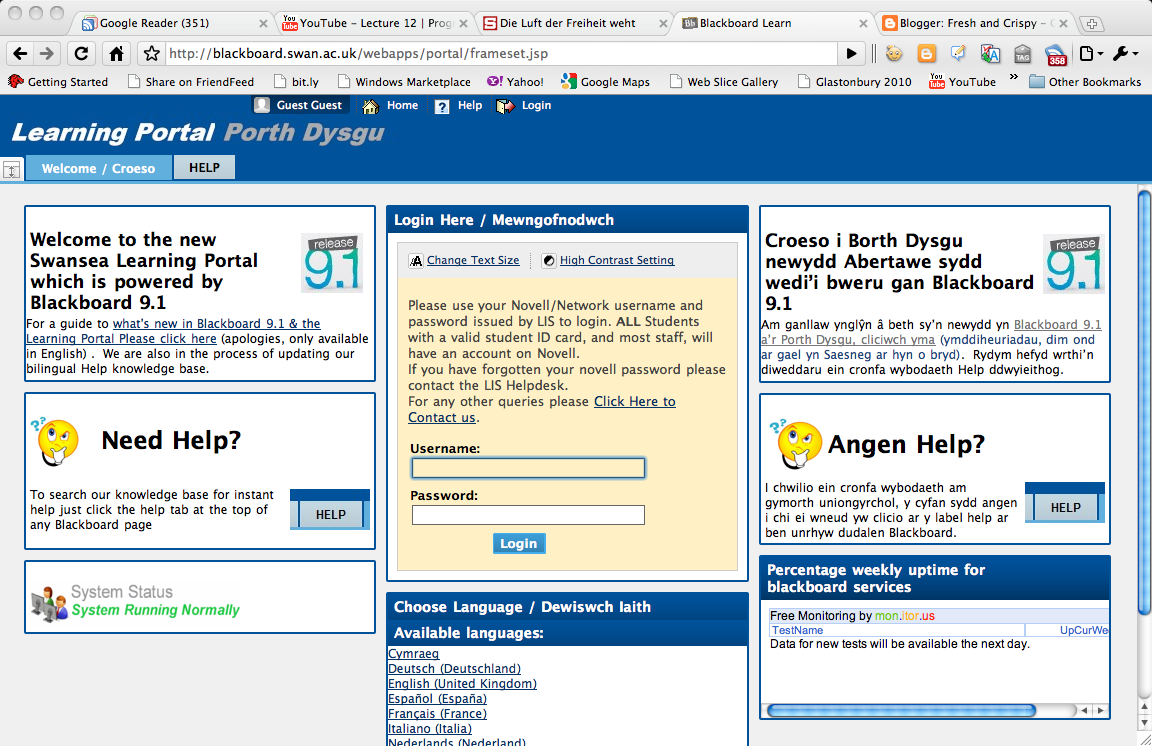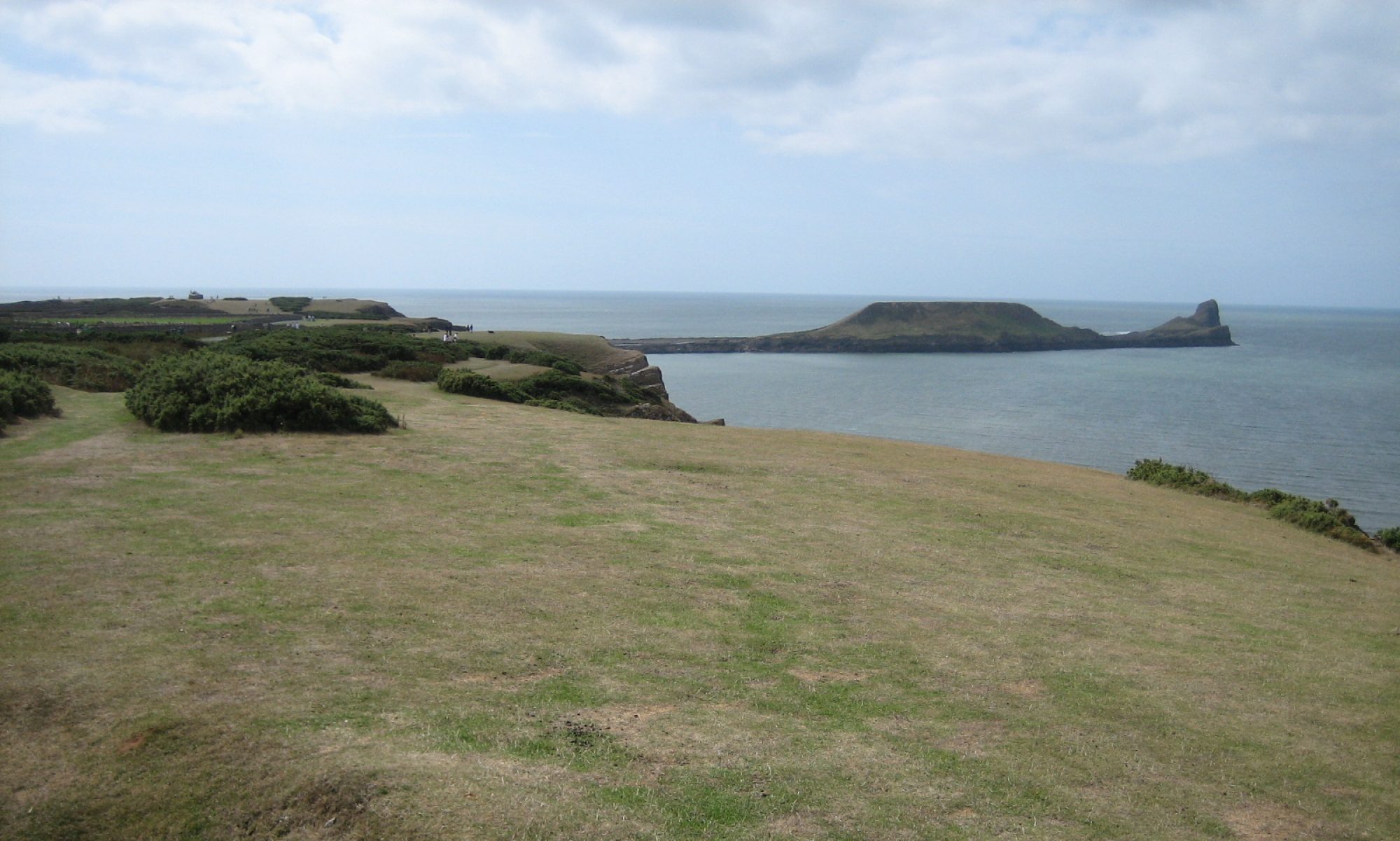Learning Objects Campus Pack, used to provide for blogs, wikis and podcasts in Swansea University’s VLE, was updated at the same time as Blackboard. If you have one or more Learning Objects blog(s), wiki(s) or podcast(s) in your Blackboard (learning portal) module sites, they will be upgraded the first time you or your students visit them.
Blackboard flag day
 Today is the day when Blackboard 9.1 was rolled out at Swansea University as the new Learning Portal. I haven’t logged in to check my courses yet, but I’m sure they’ll be fine.
Today is the day when Blackboard 9.1 was rolled out at Swansea University as the new Learning Portal. I haven’t logged in to check my courses yet, but I’m sure they’ll be fine.
Great Teaching
– The Stanford Honour Code (approach to Plagiarism)
– Use of undergraduates for peer/mentor support (even grading!)
– Use of sugary snacks as rewards for contribution
– Use of continuous assessment with later work given more marks to encourage work to the end
– Midterm tests
– Personalized feedback via “interactive marking”
– 2 Free days for late submission of coursework – avoids extensions.
Mathemagic (part the first)
This code snippet on calculating the first n Primes using the Python programming language fell into my RSS feed this morning. Very nice I thought, but then it occurred to me, what would be really fast would be to ask the internet. Or more specifically WolframAlpha. So I did: http://www.wolframalpha.com/input/?i=primes+less+than+1,000,000,000.
OSCON 2010
The O’Reilly Open Source Convention (OSCON 2010) took place last week in Portland Oregon. Videos of the talks are being published on YouTube and Blip.TV. Taken with the convention site, the various related blog postings and twitter feed, there’s lots of useful information.
What stood out for me in the video feed was Daniel Recordon’s talk “Today’s Lamp Stack” which describes how Facebook’s has been implemented on the LAMP stack. It’s a talk that will be useful as a learning resource for my course on Web Applications Technology.
For ease of access, I include the embeddable version here.
The learning message is that there’s a lot more to hosting a big site like Facebook than Linux, Apache, MySQL and PHP!
Podcast of the Week #1: E-Learning Stuff
I read a lot of blogs and I listen to a lot of podcasts, so I thought I’d use this blog to tell you about some of my favourites. Here’s the first of an occasional series of recommendations: It’s e-Learning Stuff and the associated e-Learning Stuff podcast from James Clay, ILT & Learning Resources Manager at Gloucestershire College, and 2009 winner of the ALT Learning Technologist of the Year.
– [Engaging with the VLE](http://elearningstuff.wordpress.com/2010/06/20/e-learning-stuff-podcast-051-engaging-with-the-vle/)
– [The VLE Lives](http://elearningstuff.wordpress.com/2010/03/28/e-learning-stuff-podcast-040-the-vle-lives/ “Permanent Link to e-Learning Stuff Podcast #040: The VLE Lives”)
– [Keep Calm and Carry On](http://elearningstuff.wordpress.com/2010/04/18/e-learning-stuff-podcast-043-keep-calm-and-carry-on/)
– [The VLE is Dead](http://elearningstuff.wordpress.com/2009/09/13/e-learning-stuff-podcast-028-the-vle-is-dead/ “Permanent Link to e-Learning Stuff Podcast #028: The VLE is Dead”)
On my radar
I’ve just got back to work after breaking my ankle five weeks ago and I’ve just started catching up with things in e-learning and beyond. I thought I’d enumerate a few things that are on my radar. Just a list with links for now:
– [Delicious Bookmark Browse feature](http://cogdogblog.com/2010/07/07/delicious-browsing/) (thanks to CogDogBlog). Useful for creating a presentation based on web sites. Try this one for resources I’ve collected on [plagiarism](http://delicious.com/browsebar/user/cpjobling/plagiarism).
– Open source learning object building toolkit [Xerte](http://www.nottingham.ac.uk/xerte/index.htm) (thanks to Helen Davies at the Swansea Learning Lab).
– The [WolframAlpha](http://www.wolframalpha.com/) search engine from Wolfram research (and *Mathematica*). Good introduction and interview with [Conrad Wolfram](http://www.conradwolfram.com/) in the [June 9th Edition of the Guardian Tech Weekly Podcast](http://www.guardian.co.uk/technology/blog/audio/2010/jun/08/apple-iphone-conrad-wolfram-alpha-search). Try: [http://www.wolframalpha.com/input/?i=7+May,+1959](http://www.wolframalpha.com/input/?i=7+May,+1959).
– [EduGlu](http://eduglu.com/) — a social network builder for education based on Drupal. Very early stages of development, but one to watch.

